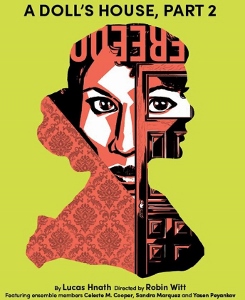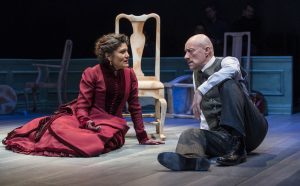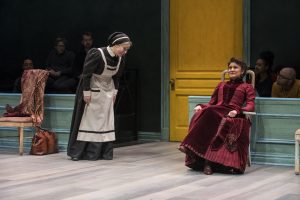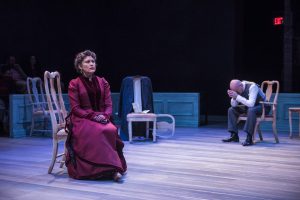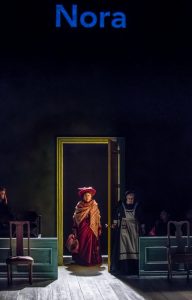A SEQUEL WITHOUT A SOUL
Some nerve. It takes chutzpah on top of arrogance to dare to continue, let alone complete, another playwright’s stand-alone masterpiece. Lucas Hnath has the temerity to imagine a sequel to A Doll’s House, Henrik Ibsen’s proto-feminist classic from 1879. It remains the still-controversial tale of a Norwegian wife who, refusing to dwindle into a “doll,” walks out on her husband and children. When Nora finally slams that door, the echo traveled around the world.
Now a Steppenwolf Theatre Chicago premiere, Robin Witt’s staging features a stellar cast of Chicago worthies and the theater’s top-notch production standards. It also has the added gimmick of seating audience members on stage as if to see a prize fight.
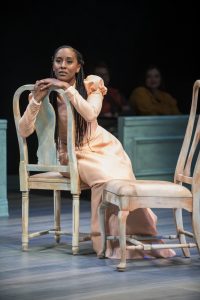 But, rehashing recriminations and rehanging dirty laundry, Hnath’s ambitious sequel fails to add anything new or valuable to the source it feeds on. He forcibly finishes a story that was decisively concluded 140 years ago. It’s like watching a dog chase its tail, the way this play sets up situation after plot device that, frustratingly, are never followed through.
But, rehashing recriminations and rehanging dirty laundry, Hnath’s ambitious sequel fails to add anything new or valuable to the source it feeds on. He forcibly finishes a story that was decisively concluded 140 years ago. It’s like watching a dog chase its tail, the way this play sets up situation after plot device that, frustratingly, are never followed through.
In A Doll’s House, Part 2 (the nerve of this piggy-backing title!) it’s 1894 and Nora (Sandra Marquez) has returned to the scene of her grand exit, reopening the door she had famously shut. Far from repenting her sudden separation, she’s now a famous writer on women’s issues. A free-thinker times ten, a sumptuously dressed Nora has managed to grandly generalize from her unhappy partnership with the boring banker Torvald (Yasen Peyankov). Perhaps overreacting, she now condemns all marriage, not just miserable liaisons, as an outmoded servitude destined to disappear. If love must be unlimited, weddings are so many slave auctions.
But, caught up in a literary lawsuit, Nora now faces penal punishment from an unsympathetic judge because, strangely, she never bothered to get a divorce. Still 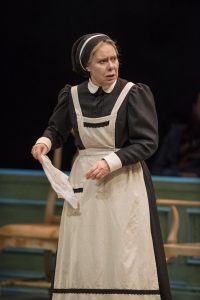 being married even as she denounces the institution, she lacks standing on the issue of female emancipation. Knowing it’s much harder for the wife to get a divorce, she’s back in the Helmer house, petitioning Torvald for a legal release.
being married even as she denounces the institution, she lacks standing on the issue of female emancipation. Knowing it’s much harder for the wife to get a divorce, she’s back in the Helmer house, petitioning Torvald for a legal release.
There she has a brittle encounter with the nanny Anne Marie (Barbara E. Robertson), a conservative caregiver who considers Nora’s authorial triumphs as “lucky” rather than earned. Anne Marie has arranged this reunion but does not want to be put on the spot.
Nora also encounters her now-teenage daughter Emmy (Celeste M. Cooper), a conventional girl who argues that marriage provides stability for individuals and order for the state.
In fact, Emmy has her own nuptials in mind and wants to avoid a repetition of the scandal from her childhood. Since everyone thought that Nora had died, not 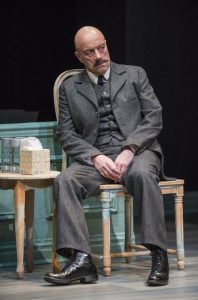 disappeared, Emmy makes the preposterous suggestion that Nora should stay that way. Her “option” is to manufacture a death certificate, change her name, and start a new life. Nora, naturally, will have none of this.
disappeared, Emmy makes the preposterous suggestion that Nora should stay that way. Her “option” is to manufacture a death certificate, change her name, and start a new life. Nora, naturally, will have none of this.
The big showdown, of course, is between husband and wife. Torvald has finally read Nora’s memoir about their broken alliance and only wishes that he had left her. He doesn’t see where he went wrong but admits he’s far from flawless.
And here Hnath, sabotaging the whole premise for Nora’s return, abandons the issue of obtaining a divorce. The play makes no effort to explain this wrenching and gratuitous course change — which amounts to one character’s complete contradiction.
Ending in a muddled stand-off, we’re left with the former spouses maundering over ancient acrimonies and what might have been, neither having convinced the other as we always knew they wouldn’t. “Send in the clowns/Don’t bother/They’re here.”
90 minutes after it began, Hnath’s second coming of a finished job has broken no new ground or exposed any interesting unintended consequences from Nora’s exit strategy. It’s just reprised stuff Ibsen settled well enough long ago. The forced humor only makes it even less believable as a follow-up to Ibsen.
The ardent performances Witt inspires from four sterling actors are wastes of talent in a pointless prolongation. Cooper, Marquez, Robertson and Peyankov work overtime to distract us from the repetitious irrelevance of a botched attempt to fix what was never broken. This paltry play is destined to be forgotten long after A Doll’s House — part one — continues to trod the boards.
A Doll’s House, Part 2
Steppenwolf Theatre Company
Steppenwolf’s Downstairs Theatre
1650 N Halsted St
ends on March 17, 2019
for tickets, call 312.335.1650 or visit Steppenwolf
for more shows, visit Theatre in Chicago
